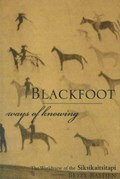Narrow Results By
Indigenous methodologies : characteristics, conversations, and contexts
https://archives.whyte.org/en/permalink/catalogue25730
- Medium
- Library - Book (including soft-cover and pamphlets)
- Published Date
- 2021
- Author
- Kovach, Margaret
- Publisher
- Toronto ; Buffalo ; London : University of Toronto Press
- Call Number
- 07.2 K84i
- Author
- Kovach, Margaret
- Publisher
- Toronto ; Buffalo ; London : University of Toronto Press
- Published Date
- 2021
- Physical Description
- xii, 313 pages : illustrations ; 23 cm
- Abstract
- An innovative and important contribution to Indigenous research approaches, this revised second edition provides a framework for conducting Indigenous methodologies, serving as an entry point to learn more broadly about Indigenous research. -- Provided by publisher.
- Contents
- Prologue: opening the circle -- Introduction -- Part One: Starting Indigenous methodologies -- Indigenous methodologies and qualitative inquiry -- Indigenous conceptual framing in Indigenous methodologies -- Part Two: Four foundations: Indigenous conceptual framing in Indigenous methodologies -- Epistemology and research: centring Indigenous knowledges -- Indigenous ethics and axiology: miny´o (A Good Way) -- Engaging with the Indigenous community in research -- Preparations: situating self, culture, and purpose in Indigenous methodologies -- Part Three: Applying Indigenous methodologies -- Story and method in Indigenous methodologies -- Indigenous theorizing -- Analysing, interpreting, and meaning making -- Presenting findings, metamorphic framing, and representation -- Oral dissemination and capacity building in Indigenous methodologies -- Part Four: Indigenous methodologies strong -- Conclusion: decolonizing the academy through asserting Indigenous methodologies -- Closing circle words and an epilogue.
- ISBN
- 9781487525644
- Accession Number
- P2023.15
- Call Number
- 07.2 K84i
- Collection
- Archives Library
This material is presented as originally created; it may contain outdated cultural descriptions and
potentially offensive content.
Read more.
Carrying the burden of peace : reimagining Indigenous masculinities through story
https://archives.whyte.org/en/permalink/catalogue25728
- Medium
- Library - Book (including soft-cover and pamphlets)
- Published Date
- 2021
- Author
- McKegney, Sam
- Publisher
- Regina, Saskatchewan, Canada : University of Regina Press
- Call Number
- 07.2 M19c
- Author
- McKegney, Sam
- Publisher
- Regina, Saskatchewan, Canada : University of Regina Press
- Published Date
- 2021
- Physical Description
- xxxiii, 263 pages : illustrations ; 24 cm
- Subjects
- Indigenous
- Indigenous Culture
- Indigenous Customs
- Indigenous Peoples
- Indigenous Traditions
- Masculinity
- Canada
- History
- Abstract
- Through rigorous engagement with Indigenous literary art, Carrying the Burden of Peace highlights the decolonial potential of Indigenous masculinities. Can a critical examination of Indigenous masculinities be an honour song--one that celebrates rather than pathologizes; one that seeks diversity and strength; one that overturns heteropatriarchy without centering settler colonialism? Can a critical examination of Indigenous masculinities even be creative, inclusive, erotic? Carrying the Burden of Peace answers affirmatively. Countering the perception that masculinity has been so contaminated as to be irredeemable, the book explores Indigenous literary art for understandings of masculinity that exceed the impoverished inheritance of colonialism. Carrying the Burden of Peace weaves together stories of Indigenous life, love, eroticism, pain, and joy to map the contours of diverse, empowered, and non-dominant Indigenous masculinities. It is from here that a more balanced world may be pursued. -- Provided by publisher.
- Contents
- Indigenous masculinities and story -- Shame and deterritorialization -- Journeying back to the body -- De(f/v)iant generosity: gender and the gift -- Masculinity and kinship -- Naked and dreaming forward: a conclusion.
- ISBN
- 9780889777934
- Accession Number
- P2023.15
- Call Number
- 07.2 M19c
- Collection
- Archives Library
This material is presented as originally created; it may contain outdated cultural descriptions and
potentially offensive content.
Read more.
Blackfoot ways of knowing : the worldview of the Siksikaitsitapi
https://archives.whyte.org/en/permalink/catalogue26211
- Medium
- Library - Book (including soft-cover and pamphlets)
- Published Date
- 2023
- Author
- Bastien, Betty
- Publisher
- Calgary : University of Calgary Press
- Edition
- 9th printing
- Call Number
- 07.2 B29b
- Author
- Bastien, Betty
- Responsibility
- Ju¨rgen W. Kremer, editor ; Duane Mistaken Chief, language consultant.
- Edition
- 9th printing
- Publisher
- Calgary : University of Calgary Press
- Published Date
- 2023
- Physical Description
- xx, 235 pages : illustrations, portraits ; 23 cm
- Subjects
- Blackfoot
- Siksikaitsitapi
- Indigenous
- Indigenous Culture
- Indigenous Customs
- Indigenous People
- Indigenous Traditions
- Indigenous Language
- Abstract
- The worldview of the Siksikaitsitapi is a journey into the heart and soul of Blackfoot culture. In sharing her personal story of coming home to reclaim her identity within that culture, Betty Bastien offers us a gateway into traditional Blackfoot ways of understanding and experiencing the world. As a scholar and researcher, Bastien is also able to place Blackfoot tradition within the context of knowledge building among indigenous peoples generally, and within an historical context of precarious survival amid colonial displacement and cultural genocide. -- From back cover
- Contents
- Context -- Introduction -- Innahkootaitsinnika'topi -- History of the Blackfoot-speaking tribes -- Introductory remarks -- Iitotasimahpi Iimitaiks -- The era of the dog or the time of the ancestors (Pre-eighteenth century) -- Ao'ta'sao'si Ponokaomita -- the era of the horse (eighteeneth century to 1880) -- Ao'maopao'si -- from when we settled in one place (1880) to today -- Cultural destruction -- policies of ordinary genocide -- Tribal protocol and affirmative inquiry -- Niinohkanistssksinipi -- Speaking personally -- Traditional knowledge in academe -- Cultural affirmation -- Protocol of affirmative inquiry -- Affirmation of indigenous knowledge -- Kakyosin -- traditional knowledge -- Kiitomohpiipotoko -- ontological responsibilities -- Siksikaitsitapi ways of knowing -- epistemology -- Knowledge is coming to know Ihtsipaitapiiyo'pa -- Kakyosin/Mokaksin -- Indigenous learning -- Niisi'powahsinni-language -- Aipommotsspistsi -- transfers -- Kaaahsinnooniksi -- grandparents -- Conclusion: renewal of ancestral responsibilities as antidote to genocide -- Deconstructing the colonized mind -- Eurocentred and Niitsitapi identity -- Reflections and implications.
- ISBN
- 9781552381090
- Accession Number
- P2023.25
- Call Number
- 07.2 B29b
- Collection
- Archives Library
This material is presented as originally created; it may contain outdated cultural descriptions and
potentially offensive content.
Read more.
Remembering our relations : De¨nesu liné oral histories of Wood Buffalo National Park
https://archives.whyte.org/en/permalink/catalogue26250
- Medium
- Library - Book (including soft-cover and pamphlets)
- Published Date
- 2023
- Publisher
- Calgary, Alberta : University of Calgary Press
- Call Number
- 07.2 At3r
- Responsibility
- Athabasca Chipewyan First Nation with Sabina Trimble and Peter Fortna.
- Publisher
- Calgary, Alberta : University of Calgary Press
- Published Date
- 2023
- Physical Description
- xxxiii, 307 pages cm
- Subjects
- Indigenous
- Indigenous Culture
- Indigenous Customs
- Indigenous People
- Indigenous Traditions
- Oral History
- Athabasca Chipewyan First Nations
- Wood Buffalo National Park
- Alberta
- British Columbia
- Abstract
- Elders and leaders remind us that telling and amplifying histories is key for healing. Remembering Our Relations is an ambitious collaborative oral history project that shares the story of Wood Buffalo National Park and the De¨nesu line´ peoples it displaced. Wood Buffalo National Park is located in the heart of De¨nesu line´ homelands, where Dené people have lived from time immemorial. Central to the creation, expansion, and management of this park, Canada’s largest at nearly 45, 000 square kilometers, was the eviction of De¨nesu line´ people from their home, the forced separation of Dene families, and restriction of their Treaty rights. Remembering Our Relations tells the history of Wood Buffalo National Park from a Dene perspective and within the context of Treaty 8. Oral history and testimony from Dene Elders, knowledge-holders, leaders, and community members place De¨nesu line´ voices first. With supporting archival research, this book demonstrates how the founding, expansion, and management of Wood Buffalo National Park fits into a wider pattern of promises broken by settler colonial governments managing land use throughout the twentieth and twenty-first centuries. By prioritizing De¨nesu line´ histories Remembering Our Relations deliberately challenges how Dene experiences have been erased, and how this erasure has been used to justify violence against De¨nesu line´ homelands and people. Amplifying the voices and lives of the past, present, and future, Remembering Our Relations is a crucial step in the journey for healing and justice De¨nesu line´ peoples have been pursuing for over a century. -- Provided by publisher.
- ISBN
- 9781773854113
- Accession Number
- P2024.02
- Call Number
- 07.2 At3r
- Collection
- Archives Library
This material is presented as originally created; it may contain outdated cultural descriptions and
potentially offensive content.
Read more.
We remember the coming of the white man
https://archives.whyte.org/en/permalink/catalogue26188
- Medium
- Library - Book (including soft-cover and pamphlets)
- Published Date
- 2021
- Author
- Blondin, Walter; Blondin, George; Goose, Leanne; Mountain, Antoine; Stewart, Sarah; Yakeleya, Raymond; and Dene Elders; foreword by Blondin, Walter.
- Publisher
- Calgary, Alberta, Canada : Durvile & UpRoute Books
- Call Number
- 07.2 St4w
- Responsibility
- Edited by Sarah Stewart and Raymond Yakeleya
- Publisher
- Calgary, Alberta, Canada : Durvile & UpRoute Books
- Published Date
- 2021
- Physical Description
- xiii, 273 pages : illustrations ; 23 cm + 1 videodisc (4 3/4 in.)
- Subjects
- Dene
- Indigenous
- Indigenous Culture
- Indigenous People
- Indigenous Customs
- Language
- Non-fiction
- Oral History
- Abstract
- Chapters are transcripts of oral histories from the early twentieth century, by ten elders of the Dene people, about the early days of fur trading, guns, and missionaries; their dismay about the way oil and uranium discoveries and pipelines were handled on their land; and the emotional fallout of the signing of Treaty 11.
- Contents
- Preface / Raymond Yakeleya -- Part I, Reflections. Foreward, Walter Blondin -- Treaty 11, Sarah Stewart -- We remember, Raymond Yakeleya -- The Dene nation / Sarah Stewart -- The Métis experience / Colette Poitras -- Part II, The elders remember. The elders / Elizabeth Yakeleya, Sarah Simon, Mary Wilson, Joe Blondin, John Blondin, Isadore Yukon, Johnny Kaye, Jim Edwards Sittichinli, Peter Thompson, Andrew Kunnizzi -- Early days -- Fur, guns, contact -- Family life -- Boat time -- Missionaries -- Oil discovery -- Treaty 11 -- The sickness -- Uranium -- First machines -- The mad trapper -- Canol road -- Mackenzie Valley pipeline -- Time of change -- Part III Stories from the people. Tutichak, Leanne Goose -- How the muskrat created the world / Antoine Mountain, Maurice Mendo -- The slingshot and the songbird / Raymond Yakeleya -- In the land of the Na?àcho / George Blondin -- The drums / George Blondin -- When the white people came / George Blondin -- Acknowledgments -- Authors -- The spirit of nature series.
- Notes
- Companion DVD includes "We remember the coming of the white man" directed by Raymond Yakeleya, 1978, 55 min. Remastered and produced in 2020. Includes director's commentary.
- ISBN
- 9781988824635
- Accession Number
- P2022.14
- Call Number
- 07.2 St4w
- Collection
- Archives Library
This material is presented as originally created; it may contain outdated cultural descriptions and
potentially offensive content.
Read more.
Me´tis rising : living our present through the power of our past
https://archives.whyte.org/en/permalink/catalogue26200
- Medium
- Library - Book (including soft-cover and pamphlets)
- Published Date
- 2022
- Publisher
- Vancouver, British Columbia : Purich Books
- Call Number
- 07.2 B71m
- Responsibility
- Edited by Yvonne Boyer and Larry Chartrand
- Publisher
- Vancouver, British Columbia : Purich Books
- Published Date
- 2022
- Physical Description
- viii, 275 pages : illustrations, maps ; 23 cm
- Abstract
- Me´tis Rising draws on a remarkable cross-section of perspectives to tell the histories, stories, and dreams of people from varied backgrounds, demonstrating that there is no single Me´tis experience - only a common sense of belonging and a commitment to justice. The contributors to this unique collection, most of whom are Me´tis themselves, examine often-neglected aspects of Me´tis existence in Canada. They trace a turbulent course, illustrating how Me´tis leaders were born out of the need to address abhorrent social and economic disparities following the Me´tis-Canadian war of 1885. They talk about the long and arduous journey to rebuild the Me´tis nation from a once marginalized and defeated people; their accounts ranging from personal reflections on identity to tales of advocacy against poverty and poor housing. And they address the indictment of the jurisdictional gap whereby neither federal nor provincial governments would accept governance responsibility towards Me´tis people. Me´tis Rising is an extraordinary work that exemplifies how contemporary Me´tis identity has been forged by social, economic, and political concerns into a force to be reckoned with."-- Provided by publisher.
- Contents
- Part 1: History, Identity, and Belonging -- River Water Flows through Our Veins / Leah Dorion and Curtis Breaton -- What's a Me´tis, Anyway? / Catherine Littlejohn -- The Right to Self-Identify as Me´tis at School / Jonathan Anuik -- Ancestral Knowledge in a Contemporary World / Yvonne Vizina -- Part 2: Leadership and Relationship Building -- Fire Starters and Keepers / Laura-Lee Bellehumeur-Kearns -- Finding a Way around the Jurisdictional Gaps / Tricia Logan -- Navigating Troubled Political Waters for Better Housing / Nathalie Kermoal -- Demanding the Right to Care for Their Own Children / Allyson Stevenson -- Part 3: Exercising Our Rights and Self-Determination -- Who Will Come to Bury You? / Paul Chartrand -- Wiichihiwayshinawn / Margaret Kress -- Stoking the Embers: A Story of Realizing Decolonizing Aims with the Me´tis through Media Agancy / Yvonne Poitras Pratt -- A Me´tis Woman's Journey of Discovery / Judith G. Bartlett
- ISBN
- 9780774880756
- Accession Number
- P2023.23
- Call Number
- 07.2 B71m
- Collection
- Archives Library
This material is presented as originally created; it may contain outdated cultural descriptions and
potentially offensive content.
Read more.
Unpapered : writers consider Native American identity and cultural belonging
https://archives.whyte.org/en/permalink/catalogue26195
- Medium
- Library - Book (including soft-cover and pamphlets)
- Published Date
- 2023
- Publisher
- Lincoln : University of Nebraska Press
- Call Number
- 07.2 G46u
- Responsibility
- Edited by Diane Glancy and Linda Rodriguez
- Publisher
- Lincoln : University of Nebraska Press
- Published Date
- 2023
- Physical Description
- xiv, 236 pages : illustrations ; 23 cm
- Subjects
- Indigenous Culture
- Indigenous Customs
- Indigenous People
- Indigenous Traditions
- History
- Turtle Island
- Identity
- Colonialism
- Abstract
- Unpapered is a collection of personal narratives by Indigenous writers exploring the meaning and limits of Native American identity beyond its legal margins. Native heritage is neither simple nor always clearly documented, and citizenship is a legal and political matter of sovereign nations determined by such criteria as blood quantum, tribal rolls, or community involvement. Those who claim a Native cultural identity often have family stories of tenuous ties dating back several generations. Given that tribal enrollment was part of a string of government programs and agreements calculated to quantify and dismiss Native populations, many writers who identify culturally and are recognized as Native Americans do not hold tribal citizenship. With essays by Trevino Brings Plenty, Deborah Miranda, Steve Russell, and Kimberly Wieser, among others, Unpapered charts how current exclusionary tactics began as a response to “pretendians”—non-indigenous people assuming a Native identity for job benefits—and have expanded to an intense patrolling of identity that divides Native communities and has resulted in attacks on peoples’ professional, spiritual, emotional, and physical states. An essential addition to Native discourse, Unpapered shows how social and political ideologies have created barriers for Native people truthfully claiming identities while simultaneously upholding stereotypes --Publisher's description.
- Contents
- Introduction / by Diane Glancy -- Show Your Papers. Paperwork / Kim Shuck -- Things you can do with your chart for calculating quantum of Indian blood / Deborah Miranda -- The white box / Kimberly L. Becker -- Seeking the Indian gravy train / Steve Russell -- Unpapered / Diane Glancy -- Finding the Way. On Chumash Land / Terra Trevor -- A salmon-fishing story / Abigail Chabitnoy -- Confessions of a detribalized mixed-blood / Jeanetta Calhoun Mish -- Thinking with Bigfoot about a Jackpine Savage : cryptogenealogical reflections / Carter Meland -- Identity Wars. "You don't look Indian" / Michele Leonard -- Pretend Indian exegesis : the pretend Indian uncanny valley hypothesis in literature and beyond / Trevino Brings Plenty -- Dead Indians. Live Indians. Legal Indians. / Ron Querry -- The animals' ballgame / Geary Hobson -- We never spoke / Linda Boyden -- Why We Matter. On being Chamorro and belonging to Guam / Craig Santos Perez -- Aunt Ruby's little sister dances / Kimberly Wieser -- Buffalo heads in diners : remnant populations / Denise Dotson Low -- And thus the tribes diminish / Linda Rodriguez.
- ISBN
- 9781496235008
- Accession Number
- P2023.15
- Call Number
- 07.2 G46u
- Collection
- Archives Library
This material is presented as originally created; it may contain outdated cultural descriptions and
potentially offensive content.
Read more.
Indigenous resurgence in an age of reconciliation
https://archives.whyte.org/en/permalink/catalogue26196
- Medium
- Library - Book (including soft-cover and pamphlets)
- Published Date
- 2023
- Publisher
- Toronto [Ontario] ; Buffalo ; London : University of Toronto Press
- Call Number
- 07.2 St2i
- Responsibility
- Edited by Heidi Kiiwetinepinesiik Stark, Aime´e Craft, and Hokulani K Aikau
- Publisher
- Toronto [Ontario] ; Buffalo ; London : University of Toronto Press
- Published Date
- 2023
- Physical Description
- vi, 263 pages : illustrations ; 23 cm
- Subjects
- Indigenous Culture
- Indigenous Customs
- Indigenous People
- Indigenous Traditions
- Reconciliation
- Colonialism
- Identity
- Gender
- Abstract
- What would Indigenous resurgence look like if the parameters were not set with a focus on the state, settlers, or an achievement of reconciliation? Indigenous Resurgence in an Age of Reconciliation explores the central concerns and challenges facing Indigenous nations in their resurgence efforts, while also mapping the gaps and limitations of both reconciliation and resurgence frameworks. The essays in this collection centre the work of Indigenous communities, knowledge, and strategies for resurgence and, where appropriate, reconciliation. The book challenges narrow interpretations of indigeneity and resurgence, asking readers to take up a critical analysis of how settler colonial and heteronormative framings have infiltrated our own ways of relating to our selves, one another, and to place. The authors seek to (re)claim Indigenous relationships to the political and offer critical self-reflection to ensure Indigenous resurgence efforts do not reproduce the very conditions and contexts from which liberation is sought. Illuminating the interconnectivity between and across life in all its forms, this important collection calls on readers to think expansively and critically about Indigenous resurgence in an age of reconciliation.-- Provided by publisher.
- Contents
- Artist Statement / Lianne Marie Leda Charlie -- Introduction: Generating a Critical Resurgence Together / Heidi Kiiwetinepinesiik Stark-- Part 1: Realizing Resurgence Together. 1. Beyond the Grammar of Settler Apologies / Mishuana Goeman -- 2. Spirit and Matter: Resurgence as Rising and (Re)creation as Ethos / Dian Million -- 3. Removing Weeds so Natives Can Grow: A Metaphor Reconsidered / Hokulani K. Aikau -- 4. (Ad)dressing Wounds: Expansive Kinship Inside and Out / Dallas Hunt -- Part 2: Claiming Our Relationships to the Political. 5. Beyond Rights and Wrongs: Towards Resurgence of a Treaty-Based Ethic of Relationality / Gina Starblanket -- 6. Thawing the Frozen Rights Theory: On Rejecting Interpretations of Reconciliation and Resurgence That Define Indigenous Peoples as Frozen in a Pre-colonial Past / Aimée Craft -- 7. Nêhiyaw Hunting Pedagogies and Revitalizing Indigenous Laws / Darcy Lindberg -- Part 3: Narrating Reconciliation and Resurgence. 8. Thinking through Resurgence Together: A Conversation between Sarah Hunt/Tlalilila’ogwa and Leanne Betasamosake Simpson / Sarah Hunt/Tlalilila’ogwa and Leanne Betasamosake Simpson -- 9. Truth-Telling amidst Reconciliation Discourses: How Stories Reshape Our Relationships / Jeff Corntassel -- 10. Political Action in the Time of Reconciliation / Corey Snelgrove and Matthew Wildcat -- Part 4: Reconciling Lands, Bodies, and Gender. 11. Body Land, Water, and Resurgence in Oaxaca / Isabel Altamirano-Jiménez -- 12. To Respect Indigenous Territorial Protocol: Hosting the Olympic Games on Indigenous Lands in Settler Colonial Canada / Christine O’Bonsawin -- 13. “Descendants of the Original Lords of the Soil”: Gender, Kinship, and an Indignant Model of Métis Nationhood / Daniel Voth -- 14. Red Utopia / Billy-Ray Belcourt.
- ISBN
- 9781487544607
- Accession Number
- P2023.10
- Call Number
- 07.2 St2i
- Collection
- Archives Library
This material is presented as originally created; it may contain outdated cultural descriptions and
potentially offensive content.
Read more.
Decolonizing sport
https://archives.whyte.org/en/permalink/catalogue26241
- Medium
- Library - Book (including soft-cover and pamphlets)
- Published Date
- 2023
- Publisher
- Halifax ; Winnipeg : Fernwood Publishing
- Call Number
- 07.2 F77d
- Responsibility
- Edited by Janice Forsyth, Christine O'Bonsawin, Russell Field, and Murray G. Phillips
- Publisher
- Halifax ; Winnipeg : Fernwood Publishing
- Published Date
- 2023
- Physical Description
- xi, 276 pages : illustrations ; 23 cm
- Subjects
- Canada
- History-Canada
- Education
- Sport
- Indigenous
- Indigenous Culture
- Indigenous People
- Indigenous Traditions
- Indigenous Customs
- Abstract
- The path to decolonization is difficult and complex, and can even be contradictory at times, as when an Indigenous community enlists the same corporate sponsor that will destroy its natural environment to provide sport programming for its youth. There is no easy way forward. The Black Lives Matter movement, and their massive followers on social media, propelled forward discussions about the inequities that Covid-19 highlighted with unprecedented momentum. Indigenous people in Canada voiced their concerns in solidarity, calling attention to disparities they faced in everything from impoverished Indigenous health care initiatives to the overrepresentation of Indigenous people in the Canadian justice system, demanding to be heard alongside systemic change. Structural adjustments were afoot, including changes in the professional sport leagues. In both the United States and Canada, people witnessed the toppling of racist sports team names and logos in the spring and summer, not the least of which included the American Washington NFL team (Redskins) and the Canadian Edmonton CFL team (Eskimos). Clearly Indigenous people and their allies saw sport as a part of this desire for social change. This multi-authored collection contributes to that desire by bringing the work of Indigenous and non-Indigenous allied scholars together to explore the history of sport, physical activity, and embodied physical culture in the Indigenous context. Including chapters that address Indigenous topics beyond the political boundaries of Canada, including the US, Australia, New Zealand/Aotearoa, and Kenya, this collection considers questions such as: How can the history of sport (a colonizing practice with European origins) exist in dialogue with Indigenous voices to open up possibilities for reconsidering the history of modern sport? How can Indigenous and anti-oppressive research methodologies/methods inform the study of sport history? What are the ethics and responsibilities associated with conducting an Indigenous sport or recreation history? How can sport history as a discipline be open to the study of traditional land-based recreation? How can the meanings of "sport" be made more inclusive to include a variety of recreational practices? How can sport historians learn from histories of colonization and how can they contribute to a more reciprocal approach to knowledge formation through Indigenous community engagement? How can the discipline of sport history meaningfully support movements of Indigenous resurgence, regeneration, and decolonization? -- Provided by publisher.
- Contents
- Ways of knowing: sport, colonialism, and decolonization / Janice Forsyth, Christine O'Bonsawin, Russell Field -- Beyond competition: an Indigenous perspective on organized sport / Brian Rice -- More than a mascot: how the mascot debate erases Indigenous people in sport / Natalie Welch -- Witnessing painful pasts: understanding images of sports at Canadian Indian residential schools / Taylor McKee and Janice Forsyth -- The absence of Indigenous moving bodies: whiteness and decolonizing sport history / Malcolm MacLean -- # 87: using Wikipedia for sport reconciliation / Victoria Paraschak -- Olympism at face value: the legal feasibility of Indigenous-led Olympic Games / Christine O'Bonsawin -- Canoe racing to fishing guides: sport and settler colonialism in Mi'kma'ki / John Reid -- Transcending colonialism?: rodeos and racing in Lethbridge / Robert Kossuth -- "Men pride themselves on feats of endurance": masculinities and movement cultures in Kenyan running history / Michelle M. Sikes -- Stealing, drinking, and not cooperating: sport and everyday resistance in Aboriginal settlements in Australia / Gary Osmond -- Let's make baseball!: practices of unsettling on the recreational ball diamonds of Tkaronto/Toronto / Craig Fortier and Colin Hastings -- Subjugating and liberating at once: Indigenous sport history as a double-edge sword / Brendan Hokowhitu.
- ISBN
- 9781773636344
- Accession Number
- P2024.02
- Call Number
- 07.2 F77d
- Collection
- Archives Library
This material is presented as originally created; it may contain outdated cultural descriptions and
potentially offensive content.
Read more.
Plants, people, and places : the roles of ethnobotany and ethnoecology in Indigenous peoples' land rights in Canada and beyond
https://archives.whyte.org/en/permalink/catalogue25723
- Medium
- Library - Book (including soft-cover and pamphlets)
- Published Date
- 2020
- Publisher
- Montreal ; Kingston ; London ; Chicago : McGill-Queen's University Press
- Call Number
- 07.2 T85p
- Responsibility
- Edited by Nancy J. Turner
- Publisher
- Montreal ; Kingston ; London ; Chicago : McGill-Queen's University Press
- Published Date
- 2020
- Physical Description
- xxxii, 480 pages : illustrations, maps ; 25 cm.
- Subjects
- Indigenous
- Indigenous Culture
- Indigenous Traditions
- Indigenous Peoples
- Indigenous Customs
- Plants, Edible
- Plants, Medicinal
- Abstract
- For millennia, plants and their habitats have been fundamental to the lives of Indigenous Peoples--as sources of food and nutrition, medicines, and technological materials--and central to ceremonial traditions, spiritual beliefs, narratives, and language. While the First Peoples of Canada and other parts of the world have developed deep cultural understandings of plants and their environments, this knowledge is often underrecognized in debates about land rights and title, reconciliation, treaty negotiations, and traditional territories. Plants, People, and Places argues that the time is long past due to recognize and accommodate Indigenous Peoples' relationships with plants and their ecosystems. Essays in this volume, by leading voices in philosophy, Indigenous law, and environmental sustainability, consider the critical importance of botanical and ecological knowledge to land rights and related legal and government policy, planning, and decision making in Canada, the United States, Sweden, and New Zealand. Analyzing specific cases in which Indigenous Peoples' inherent rights to the environment have been denied or restricted, this collection promotes future prosperity through more effective and just recognition of the historical use of and care for plants in Indigenous cultures. A timely book featuring Indigenous perspectives on reconciliation, environmental sustainability, and pathways toward ethnoecological restoration, Plants, People, and Places reveals how much there is to learn from the history of human relationships with nature"-- Provided by publisher.
- Contents
- Introduction: Making a Place for Indigenous Botanical Knowledge and Environmental Values in Land-Use Planning and Decision Making / Nancy J. Turner, Pamela Spalding, and Douglas Deur (Moxmowisa) -- Living from the Land: Food Security and Food Sovereignty Today and into the Future / Jeannette Armstrong -- Nuuc aan ul Plants and Habitats as Reflected in Oral Traditions: Since Raven and Thunderbird Roamed / Marlene Atleo ( eh eh nah tuu kwiss) -- Tamarack and Tobacco / Aaron Mills -- Xa´xli'p Survival Territory: Colonialism, Industrial Land Use, and the Biocultural Sustainability of the Xa´xli'p within the Southern Interior of British Columbia / Arthur Adolph -- Understanding the Past for the Future: Archaeology, Plants, and First Nations' Land Use and Rights / Dana Lepofsky, Chelsey Geralda Armstrong, Darcy Mathews, and Spencer Greening -- Preparing Eden: Indigenous Land Use and European Settlement on Southern Vancouver Island / John Sutton Lutz -- A Place Called Pi´psell: An Indigenous Cultural Keystone Place, Mining, and Secwe´pemc Law / Marianne Ignace and Chief Ronald E. Ignace -- Traditional Plant Medicines and the Protection of Traditional Harvesting Sites / Letitia M. McCune and Alain Cuerrier -- From Traplines to Pipelines: Oil Sands and the Pollution of Berries and Sacred Lands from Northern Alberta to North Dakota / Linda Black Elk and Janelle Marie Baker -- The Legal Application of Ethnoecology: The Girjas Sami Village versus the Swedish State / Lars O¨stlund, Ingela Bergman, Camilla Sandstro¨m, and Malin Bra¨nnstro¨m -- Ta¯ne Mahuta: The Lord of the Forest in Aotearoa New Zealand, His Children, and the Law / Jacinta Ruru -- Cultivating the Imagined Wilderness: Contested Native American Plant Gathering Traditions in America's National Parks / Douglas Deur (Moxmowisa) and Justine E. James Jr -- Ki¯puka Kuleana: Restoring Reciprocity to Coastal Land Tenure and Resource Use in Hawai i / Monica Montgomery and Mehana Blaich Vaughan -- Right Relationships: Legal and Ethical Context for Indigenous Peoples' Land Rights and Responsibilities / Kelly Bannister -- Ethnoecology and Indigenous Legal Traditions in Environmental Governance / Deborah Curran and Val Napoleon -- Indigenous Environmental Stewardship: Do Mechanisms of Biodiversity Conservation Align with or Undermine It? / Monica E. Mulrennan and Ve´ronique Bussie`res -- Tsilhqot'in Nation Aboriginal Title: Ethnoecological and Ethnobotanical Evidence and the Roles and Obligations of the Expert Witness / David M. Robbins and Michael Bendle -- Plants, Habitats, and Litigation for Indigenous Peoples in Canada / Stuart Rush, QC -- Restorying Indigenous Landscapes: Community Restoration and Resurgence / Jeff Corntassel -- Partnerships of Hope: How Ethnoecology Can Support Robust Co-Management Agreements between Public Governments and Indigenous Peoples / Pamela Spalding -- "Passing It On": Renewal of Indigenous Plant Knowledge Systems and Indigenous Approaches to Education / Leigh Joseph (Styawat) -- On Resurgence and Transformative Reconciliation / James Tully -- Retrospective and Concluding Thoughts / Nancy J. Turner with E. Richard Atleo (Umeek) and John Ralston Saul -- Epilogue: Native Plants, Indigenous Societies, and the Land in Canada's Future / Douglas Deur (Moxmowisa), Nancy J. Turner (Galitsimg a), and Kim Recalma-Clutesi (Oqwilowgwa).
- ISBN
- 9780228001836
- Accession Number
- P2023.13
- Call Number
- 07.2 T85p
- Collection
- Archives Library
This material is presented as originally created; it may contain outdated cultural descriptions and
potentially offensive content.
Read more.
Sharing the land, sharing a future
https://archives.whyte.org/en/permalink/catalogue25715
- Medium
- Library - Book (including soft-cover and pamphlets)
- Published Date
- 2021
- Publisher
- Winnipeg, Manitoba, Canada : University of Manitoba Press
- Call Number
- 07.2 G76s
- Responsibility
- edited by Katherine A. H. Graham and David Newhouse
- Publisher
- Winnipeg, Manitoba, Canada : University of Manitoba Press
- Published Date
- 2021
- Physical Description
- xi, 499 pages : illustrations, maps ; 23 cm
- Abstract
- Sharing the Land, Sharing a Future looks to both the past and the future as it examines the foundational work of the Royal Commission on Aboriginal Peoples (RCAP) and the legacy of its 1996 report. It assesses the Commission's influence on subsequent milestones in Indigenous-Canada relations and considers our prospects for a constructive future. RCAP's five-year examination of the relationships of First Nations, Metis, and Inuit peoples to Canada and to non-Indigenous Canadians resulted in a new vision for Canada and provided 440 specific recommendations, many of which informed the subsequent work of the Truth and Reconciliation Commission of Canada (TRC). Considered too radical and difficult to implement, RCAP's recommendations were largely ignored, but the TRC reiterates that longstanding inequalities and imbalances in Canada's relationship with Indigenous peoples remain and quite literally calls us to action. With reflections on RCAP's legacy by its co-chairs, leaders of national Indigenous organizations and the Minister of Indigenous Crown Relations, and leading academics and activists, this collection refocuses our attention on the groundbreaking work already performed by RCAP. Organized thematically, it explores avenues by which we may establish a new relationship, build healthy and powerful communities, engage citizens, and move to action. -- Provided by publisher.
- Contents
- FOREWORD "We Are All Here to Stay": The Sharing the Land, Sharing a Future Forum Marking the Twentieth Anniversary of RCAP / Marlene Brant Castellano and Frederic Wien -- INTRODUCTION -- Charting a Way Forward / Katherine A.H. Graham and David Newhouse -- PART 1: SETTING THE SCENE FOR A NEW NATION-TO NATION RELATIONSHIP -- Completing Confederation: The Necessary Foundation / Frances Abele, Erin Alexiuk, Satsan (Herb George) and Catherine MacQuarrie -- Twenty Years Later: The RCAP Legacy in Indigenous Health System Governance--What about the Next Twenty? / Yvonne Boyer, Jose´e Lavoie, Derek Kornelsen, and Jeff Reading -- PART 2: CREATING THE VISION FOR A NEW NATION-TO_NATION RELATIONSHIP -- Address by René Dussault, Co-Chair, Royal Commission on Aboriginal Peoples -- Address by Georges Erasmus, Co-Chair, Royal Commission on Aboriginal Peoples -- Address by Perry Bellegarde, National Chief, Assembly of First Nations -- Address by Natan Obed, President, Inuit Tapiriit Kanatami -- Address by Clément Chartier, President, Me´tis National Council -- Address by Robert Bertrand, National Chief, Congress of Aboriginal Peoples -- Address by Francyne Joe, President, Native Women's Association of Canada -- Address by Carolyn Bennett, Minister of Indigenous and Northern Affairs Canada -- PART 3: POWERFUL COMMUNITIES, HEALTHY COMMUNITIES -- Thunderbird Is Rising: Indigenizing Education in Canada / Jo-ann Archibald Q'um Q'um Xiiem and Jan Hare-- Insights into Community Development in First Nations: A Poverty Action Research Project / Jennifer S. Dockstator, Jeff S. Denis, Frederic Wien, Gerard Duhaime, Mark S. Dockstator, David Newhouse, Wanda Wuttunee, Charlotte Loppie, John Loxley, Warren Weir, Eabametoong First Nation, Misipawtisik Cree First Nation, Opiticiwan Atikamekw Firs Nation, Sipekne'katik First Nation, and T'it'q'et -- Indigenous Economic Development with Tenacity / Wanda Wutunee, Fredric Wien, and David Newhouse -- Powerful Communities, Healthy Communities: A Twenty-Five Year Journey of Healing and Wellness / Caroline l. Tait, Devon Napope, Amy Bombay, William Mussell, First Peoples First Person, and Canadian Depression Research and Intervention Network -- Cultural Safety / Carrie Bourassa, Eric Olesen, Sibyl Diver, and Janet McElhaney -- What Will It Take? Ending the Canadian Government's Chronic Failure to Do Better for First Nations Children and Families When It Knows Better / Cindy Blackstock -- Art of Healing and Reconciliation: From Time Immemorial through RCAP, the TRC, and Beyond / Jonathan Dear -- PART 4: MOVING TO ACTION -- Engaging Citizens in Indigenous-Non-Indigenous Relations / Lynne Davfs and Chris Hillier -- SSHRC and the Conscientious Community: Reflecting and Acting on Indigenous Research and Reconciliation in Response to CTA 65 / Aaron Franks -- Canada's Aboriginal Policy and the Politics of Ambivalence: A Policy Tools Perspective / Daniel Sale´e and Carole Le´vesque -- Executive Summary: Canadian Public Opinion on Aboriginal Peoples / Michael Adams, The Environics Institute -- Conclusion: What's the Way Forward? / Katherine A.H. Graham and David Newhouse -- Appendix : Sharing the Land, Sharing a Future Forum Oversight Committee.
- Notes
- Selected revised papers presented at a conference, the Royal Commission on Aboriginal Peoples Forum, "Hear Our Voice", in November, 2016, held in Winnipeg.
- ISBN
- 9780887558689
- Accession Number
- P2023.09
- Call Number
- 07.2 G76s
- Collection
- Archives Library
This material is presented as originally created; it may contain outdated cultural descriptions and
potentially offensive content.
Read more.











